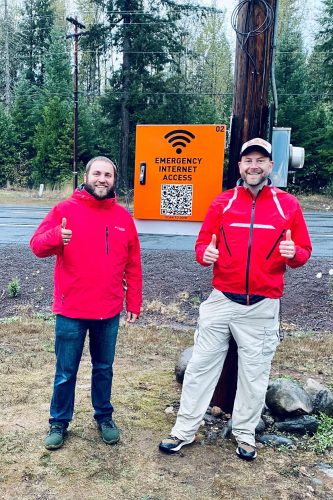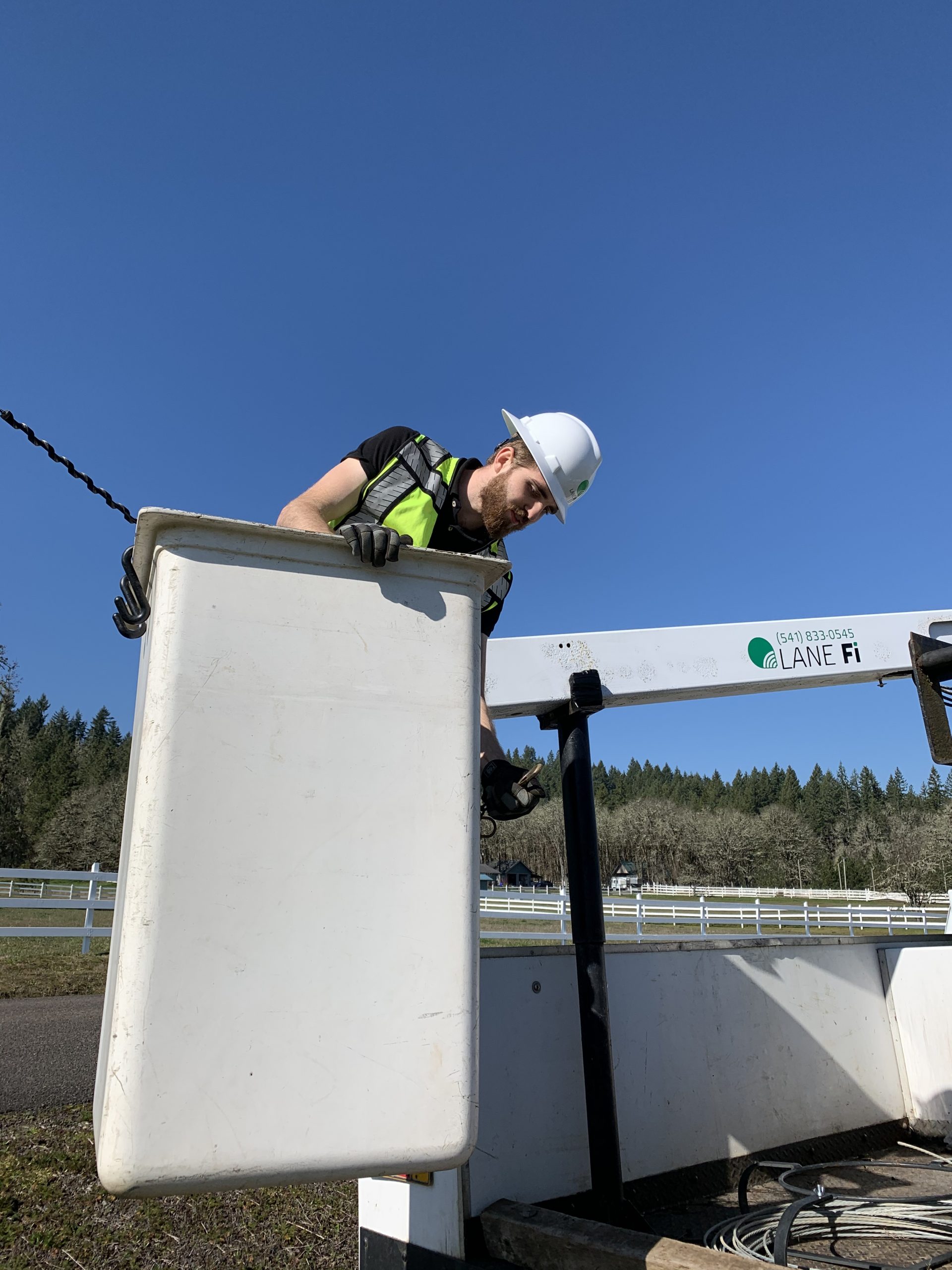
For more than a year, many people in Lane County have been working from home, but for rural residents, it’s been a period of spotty service, frozen Zoom screens and expensive bills.
But there’s hope, even as the COVID-19 pandemic loosens its grip, that rural internet could improve.
In Lane County, government grants are helping nonprofits and companies expand internet connection for rural homes. The pathway to better rural internet access includes government grants to smaller internet service providers to provide necessary infrastructure, as well as resiliency in case of natural disasters. And delivery requires deciding when to use fiber optic cables, wireless — or both.
Months after the start of the pandemic, the state agency Business Oregon received millions of dollars in federal CARES Act money to distribute to companies and nonprofit organizations in Oregon. Locally owned Lane Fi was one of the recipients, receiving $145,354.34.
Lane Fi Chief Operating Officer Madeleine Sisson says the company was on track to providing fiber optic cable access to homes in the southwest Eugene area, but money from Business Oregon jump-started their efforts to move beyond there.
“People were still signing up for our service because we were in the middle of a pandemic, so everyone needed the internet super badly,” she says.
Lane Fi specializes in providing fiber optic cables to homes and businesses in the rural area. Though its customers are currently located in southwest Eugene, Sisson says the company can easily bring fast internet that’s reliable to other areas.
Lane Fi Chief Executive Officer Nolie Scheid says fiber optic cable technology is simpler and more efficient than wireless. A fiber optic cable is passive, he adds, meaning there isn’t a need for electricity to boost the internet signal. Lane Fi started with wireless internet delivery, he says, but faced with high maintenance costs and obstruction from trees, it transitioned to fiber optic cables.
Sisson says Lane Fi is wrapping up a project that will have laid 10 miles of fiber optic cables, providing high speed internet for 130 residents who are able to access Lane Fi’s internet. With the Business Oregon grant, the company has plans to expand fiber optic infrastructure to about 750 residents in the rural southwest Eugene area, Sisson says.
The company’s model has a grassroots aspect, in which it delivers fiber optic cable if enough demand is clustered in close proximity. “If people are interested in our service, they can reach out to us,” she says. “Even if you were in Idaho, we could get you service, you just have to have enough people interested in the area.”
There has been some demand for Lane Fi’s services in southeast Eugene, but Scheid says the company is currently focused on delivering fiber optic cables to their wireless customers and maintaining internet speeds.
The state of rural internet right now, Sisson says, isn’t that great. In some areas residents have a few choices from big name corporations, but the reception is poor — and some people even struggle to send an email. There are smartphone hotspots, too, but those can make monthly cell phone bills costly, she adds.
Sisson says about 10 percent of Lane Fi’s customers are small business owners, in addition to the number of people learning and working from home.

Although Lane Fi spent CARES Act money to accelerate fiber optic cable delivery in rural areas, the funding doesn’t mean residents are accessing Lane Fi’s internet service for free, Scheid says.
Scheid says some companies advertise high speeds but don’t deliver. Lane Fi places the cables on utility poles, so it offers faster speeds, and Scheid says the company’s infrastructure could handle 10 gigabit speeds eventually.
Local internet service providers like Lane Fi will lead the charge on bringing broadband to rural areas, says Lane County Commissioner Heather Buch, who represents much of rural south Lane County.
“They’re the only ones willing to go out into these communities that are less dense and work out an actual plan to get to as many houses as possible,” Buch says.
Buch says Lane County’s economic development arm has a plan for bringing rural internet — and has had it on paper for years. The missing puzzle piece is political will and funding, she adds. But with the pandemic and historic wildfires, interest from Congress has increased. “Rural internet is something that people rely on every day for basic tasks but also critical to our safety in case of natural disasters,” Buch says. “Our biggest hurdle beyond political will and resources is our topography.”
Lane County’s geography, she adds, makes it challenging to dig underground for fiber optic infrastructure, and the abundance of trees makes wireless difficult. The county needs a system that uses a mixture of a fiber backbone, wifi hopping and trenching for broadband, Buch says. And then you have to factor in how to be resilient when a natural disaster hits, she adds.
As a county commissioner, Buch says she’s been advocating for more fiber optic resiliency, emergency communications and redundancies, “so if it fails, there’s backup.” She adds, “It is really important in the context of climate change and natural disaster resiliency.”
An example of what Buch is advocating for will soon be in the town of Blue River.
Onward Eugene, an economic development nonprofit, received a $300,000 grant from Project Overcome, a $2.7 million effort to expand broadband internet throughout the country supported by U.S. Ignite, the National Science Foundation and Schmidt Futures firm. Blue River is the only town in the U.S. West to receive the money for internet development.
“How to better build internet infrastructure in a way that’s resilient to natural disasters,” Onward Eugene Managing Director Matt Sayre says, when you have long stretches of fiber optic cable along the highways, it’s a big surface area for something to go wrong. And that’s exactly what happened to McKenzie after the Holiday Farm Fire.”
So, Sayre adds, Onward Eugene’s plan is to build the internet “back better” in McKenzie. Blue River has one connection to broadband, he adds, “which is literally a cable on a phone pole.” And the educational network will provide around 100 hotspot wifi devices for families around the burn area in Blue River, he says.
If the fiber optic connection on Highway 126 is disrupted, Sayre says, the school in the area would still have an internet connection through the resilience connection. Any students or families relying on the school’s hotspots would have wireless access since it’ll work even if the electricity is cut after a natural disaster.
The hotspots will get internet connection wirelessly from Bend, via a “microwave backhaul” connection.
Geoff Turner, CEO of Elevate Technology Group based in Portland, is one of the partners on the Blue River project. Turner says the microwave backhaul was originally designed by the Oregon Internet Response, a group that assisted restoring the internet in the McKenzie River area after the Holiday Farm Fire. Elevate Tech then took ownership of the idea and upgraded it, he adds.
Basically a microwave backhaul uses radio waves to communicate data, and for this project, the connection network goes from Bend to Hoodoo Ski Area to an EWEB tower in the middle of nowhere to Belknap Bluff. “Instead of running fiber across lava fields and things like that, which would take a lot of time and money, wireless technology is cheaper and quicker to get in place,” he says.
The Blue River project starts immediately and plans to be active in fall 2021, and Sayre says the project intends to make frugality a priority so it can be a resiliency model for other rural areas. “We are hopeful that this isn’t going to just make things better for folks in Blue River, but hope it inspires other communities to take action and address this challenge so we’ll all be prepared for a challenge in the future,” he says.
And the project has already led to some investment in other rural areas near Blue River.
Turner says the federal grant is an opportunity to build out reliable internet in the McKenzie area and Elevate Tech is investing around $200,000 to $300,000 to expand past Blue River. Elevate Tech’s investment will provide internet service to Rainbow, McKenzie Bridge and Belknap areas while using local contractors for jobs, such as excavating, to keep the money circulating in the local economy.
“We’re taking what we’re building on and expanding past that because there are people who need it,” Turner says. “We’re going to keep building on top of it and keep investing in the area.”